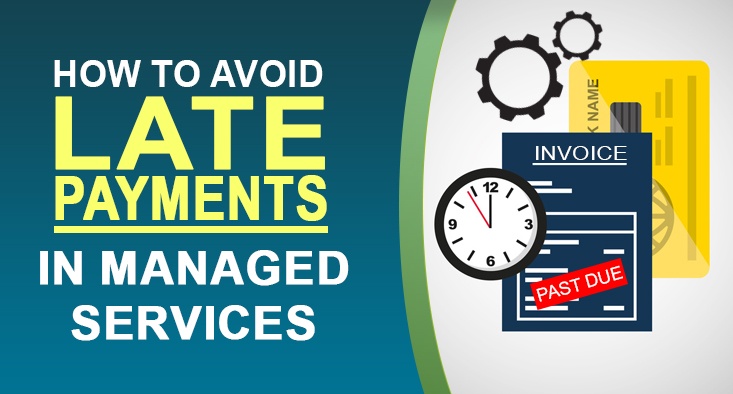- You are here:
- Home »
- Blog »
- MSP Sales »
- How to Avoid Late Payments in Managed Services

How to Avoid Late Payments in Managed Services
You might have envisioned your managed service business as a smooth sailing trip. But when it comes to late payments, reality hits you soon enough. Even if you do an excellent job every time, somehow that paycheck eludes you. Of course, not all managed service clients are like that. There are those who truly value your work. But there are clients who seem to have endless excuses for not paying for your services. And we can say that late payment is perhaps one of the major challenges in managed services all over the world.
Here are some tips for making sure you get paid for your hard work, and on time.
Upfront Payment
Before you go on a late payment collection crusade, let’s talk about prevention first. Late payments, while at times can’t be avoided, are situations that you can keep in check. At the onset of your business relationship, it will do you a lot of good if you do a credit check on your new client. That is if you have the means to do so. By this, you’ll be able to see if the business is a good credit risk, or if they have a history of late payments. From this point, you’ll be able to plan your next step.
If a business turns out to be a credit risk, it’s only reasonable for you to ask for upfront payment. Even if you’re not able to do a credit check, this policy will still work for your business. And this is especially true if it’s a client that you haven’t worked with before. Most progressive MSPs find this practice to be practical and more profitable. You can also have this agreement drafted into your contract.
Out-of-scope Charges
But there can still be additional charges for out-of-scope services. Even if you already have upfront payments for your recurring monthly fee. At times, your client may need hardware replacement. It would be reasonable to ask for upfront payment for hardware. But you can deter late payments for extra services by implementing a balance cap and then a late payment fee.
A balance cap will fairly limit how much your client owes you, and will save you from a lot of headaches. This practice is very common in utility services, and it works. When a customer exceeds the balance cap, payment is required or the service is cut off. It doesn’t need to be this drastic when it comes to your managed services business. But having this policy is a good safeguard. So think carefully how this can work for your manage service business.
Another practice that can discourage late payments is by charging overdue interest. Let’s face it, you went into business to provide IT services and not to be a bank. But even banks charge a penalty for late payments. And if you check utilities such as power, water, and even telecom, they all charge reasonable interest if you miss your due date. Some charge 10% per month, and some even charge .05% a day which amounts to a little above 15% in a month. Bear in mind that interest never sleeps, never takes a day off, and never takes a holiday. And your clients are aware of this, too. So while very late payments do happen, you can sleep better knowing that your money earns for you.
But of course, you have to make sure that these policies are well drafted into your contract from the start. Give careful attention to your documentation too, like sending out notice of late payment to your client. This is to make sure that you have everything covered in case you need to suspend services or charge interest.
If your client adamantly refuses to agree with these reasonable terms, then it’s most likely that payment will be an issue. At this point you would have to decide which you would rather do. Would you walk away from a bad situation before it happens, or welcome the sting of doing work and not getting paid for it?
Automate Payments
An important step into easing payment issues is making sure that your invoice doesn’t end up at a dead end. Many businesses use services to process payments automatically on a regular schedule. You can look up several services that will allow you to accept payment by credit card and then set up an autopay option for your monthly recurring fee.
Automated clearing and standing orders can also help with your payment problems. Most IT companies make use of Standing Order instruction, which is free and simple to set up. This is where a bank account holder gives the authorization to pay a set amount to another account at regular intervals. This can only guarantee the recurring monthly charges and not the out-of-scope service that may occur from time to time. You can do your own research to find out what will work for your business. And how you can use such services to minimize your billing challenges.
Dealing with late payments in your managed services can be discomforting. But it shouldn’t be a problem if you avoid it in the first place. Provide clear and thorough payment terms in your contract. Then there’s no reason for you not to expect payment on time.
